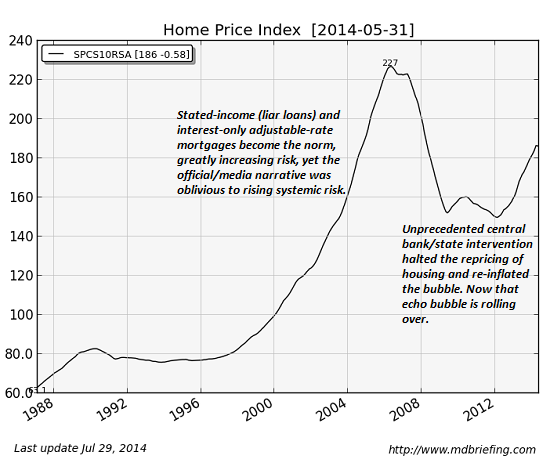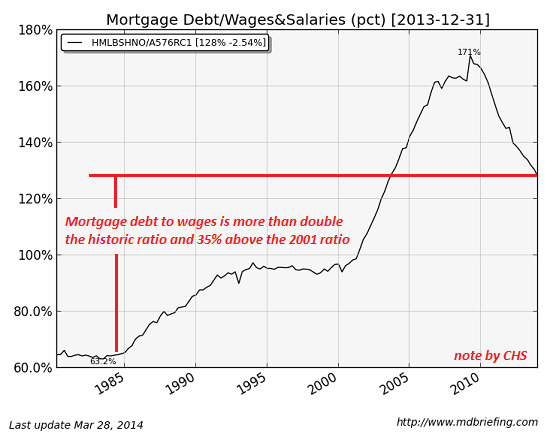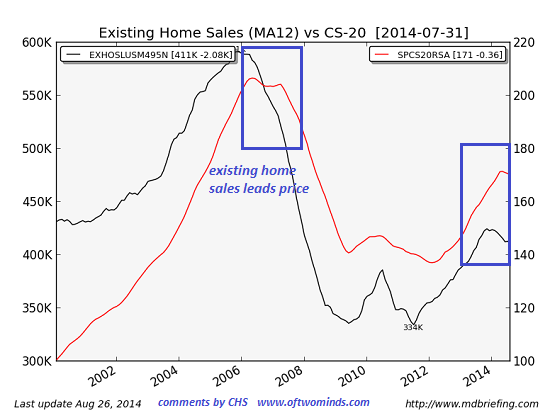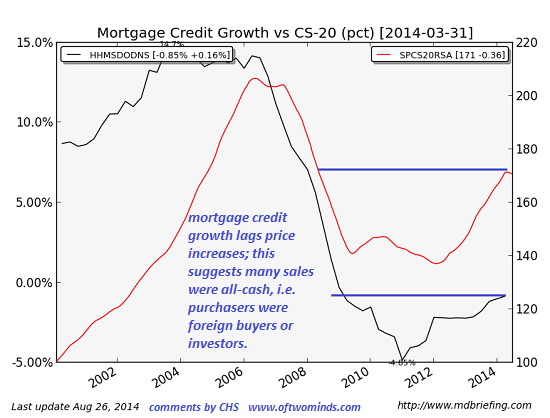There is nothing remotely "normal" about the echo-bubble's rise, and we can anticipate that its deflation will be equally abnormal.
Conventional wisdom on the resurgence of the housing markets takes one of two paths:
1. Housing is not in a bubble, it is merely returning to "normal"
2. Housing is bubbly in some markets, but prices will continue to rise
Here's an alternative view: housing is in an echo-bubble that's popping. Courtesy of the excellent Market Daily Briefing, here are some charts that make the case that the housing echo-bubble was just another Federal Reserve-induced speculative asset bubble that's popping, like every other speculative bubble in recorded history.
First up: home prices, as measured by the Case-Shiller Price Index. Note the near-perfect symmetry of the echo-bubble: it has taken roughly the same time-span to inflate and reach a top as the first housing bubble from January 2004 to its peak 2+ years later.
The echo-bubble has topped out at about 50% of the decline from the primary bubble top to the trough in 2012.
The distorted fundamentals of the echo-bubble are revealed in this chart of mortgage debt to wages. Current levels of mortgage debt are double historic levels, and 35% above the level of 2001, when the primary housing bubble lifted off.
The third charts tells us the echo-bubble is popping. Note that housing sales lead price by about six months: sales started falling in late 2005, and prices rolled over in mid-2006.
Housing sales rolled over in December 2013, and sure enough, prices are starting to weaken in many markets.
The echo-bubble doesn't pass the sniff test as a "normal" housing recovery. Exhibit #1: who's buying and who's not buying:
1. Marginal buyers using 3% down-payment FHA/VA loans who wouldn't qualify for conventional mortgages. The risk of marginal borrowers defaulting is high, a reality reflected in FHA's default rate:
When lending sources dried up during the financial crisis, the FHA propped up the housing market by insuring the lenders it works with against losses and enticing them back into the market. But the FHA’s default rate shot up as its loan volume expanded, depleting its cash reserves to levels below what is required by law. In September 2013, the FHA tapped taxpayer money to cover its losses for the first time in the agency’s 80-year history.
3. The dominance of all-cash buyers--generally investors (those close to the money spigots of the Fed's free money for financiers) and foreign buyers.
Note the difference between mortgage credit expansion, which has lagged price gains. This suggests many of the sales (about 35% in many hot markets) were all-cash purchases that did not require a mortgage
Take away the Fed's zero-interest rate policy (ZIRP), its free money for financiersand foreign buyers seeking a safe haven for their hot money, and what's left of the supposedly "normal" housing recovery? Not much.
There is nothing remotely "normal" about the echo-bubble's rise, and we can anticipate that its deflation will be equally abnormal.
How do we know when an asset class is in a bubble? When everyone who stands to benefit from the continuation of the expansion declares it can't be a bubble.
Get a Job, Build a Real Career and Defy a Bewildering Economy(Kindle, $9.95)(print, $20)
 Are you like me? Ever since my first summer job decades ago, I've been chasing financial security. Not win-the-lottery, Bill Gates riches (although it would be nice!), but simply a feeling of financial control. I want my financial worries to if not disappear at least be manageable and comprehensible.
Are you like me? Ever since my first summer job decades ago, I've been chasing financial security. Not win-the-lottery, Bill Gates riches (although it would be nice!), but simply a feeling of financial control. I want my financial worries to if not disappear at least be manageable and comprehensible.
And like most of you, the way I've moved toward my goal has always hinged not just on having a job but a career.
You don't have to be a financial blogger to know that "having a job" and "having a career" do not mean the same thing today as they did when I first started swinging a hammer for a paycheck.
Even the basic concept "getting a job" has changed so radically that jobs--getting and keeping them, and the perceived lack of them--is the number one financial topic among friends, family and for that matter, complete strangers.
So I sat down and wrote this book: Get a Job, Build a Real Career and Defy a Bewildering Economy.
It details everything I've verified about employment and the economy, and lays out an action plan to get you employed.
I am proud of this book. It is the culmination of both my practical work experiences and my financial analysis, and it is a useful, practical, and clarifying read.
Test drive the first section and see for yourself. Kindle, $9.95 print, $20
"I want to thank you for creating your book Get a Job, Build a Real Career and Defy a Bewildering Economy. It is rare to find a person with a mind like yours, who can take a holistic systems view of things without being captured by specific perspectives or agendas. Your contribution to humanity is much appreciated."
Laura Y.
Gordon Long and I discuss The New Nature of Work: Jobs, Occupations & Careers (25 minutes, YouTube)
NOTE: Contributions/subscriptions are acknowledged in the order received. Your name and email remain confidential and will not be given to any other individual, company or agency.
| Thank you, Steve S. ($5/month), for your splendidly generous subscription to this site -- I am greatly honored by your support and readership. | | Thank you, Jennifer G. ($50), for your superbly generous contribution to this site -- I am greatly honored by your support and readership. |




 Are you like me? Ever since my first summer job decades ago, I've been chasing financial security. Not win-the-lottery, Bill Gates riches (although it would be nice!), but simply a feeling of financial control. I want my financial worries to if not disappear at least be manageable and comprehensible.
Are you like me? Ever since my first summer job decades ago, I've been chasing financial security. Not win-the-lottery, Bill Gates riches (although it would be nice!), but simply a feeling of financial control. I want my financial worries to if not disappear at least be manageable and comprehensible.


























